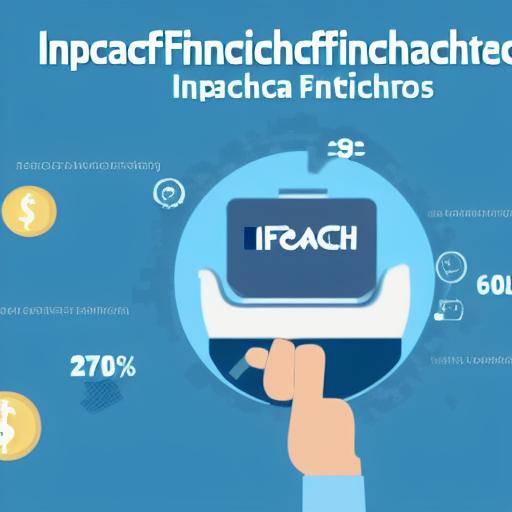
In the digital era, speed, efficiency and technology are key factors in improving financial transactions. The fintech industry has become a disruptive agent, revolutionizing the way people and companies handle their assets. In this article, we will explore how fintechs are optimizing speed and efficiency in financial transactions through technology, analyze cases of success, prospects, future trends and practical advice.
Introduction
With the advancement of technology, the speed in financial transactions has become a fundamental requirement. The fintech industry, a combination of "finances" and "technology," has emerged as a vital resource for improving efficiency in financial services. Throughout this article, we will explore the significant impact that speed and efficiency, supported by the latest technological innovations, have had on the financial industry.
History and Background
The fintech revolution has not happened overnight. To understand the full extent of its impact on the speed and efficiency of financial transactions, it is crucial to examine its history and evolution. From its humble beginnings to its present omnipresence, the history of the fintech industry offers us a fascinating vision of its progress.
In the 1950s, credit cards and ATMs marked an important milestone in the automation of financial transactions. However, the real revolution came with the arrival of the Internet in the 1990s, allowing for faster and more efficient financial processes. As fintech began to proliferate, its impact became evident in cost reduction and the facilitation of ultra-fast transactions globally.
Detailed Analysis
The advantages of fintech in terms of speed and efficiency are undeniable. The ability to perform transactions in a matter of seconds, compared to the days that traditional methods used to take, has been a transformative change. In addition, the automation of financial processes has reduced the possibility of errors and fraud, resulting in greater efficiency and security.
However, fintech has faced challenges, especially in terms of regulation and cybersecurity. Rapid technological developments also pose constant challenges to keep up with the latest trends and ensure the security of transactions. Despite these obstacles, Fintech continues to guide the financial industry and continue to improve the speed and efficiency of transactions.
Comprehensive review
Fintech applications cover a wide range of financial services, from mobile payments to peer-to-peer loans. In each of these sectors, fintech has demonstrated their ability to streamline processes, reduce costs and improve customer experience. In addition, the use of artificial intelligence and automatic learning is leading the speed and efficiency of fintech to new levels, allowing faster and more accurate decision-making.
In considering future prospects, it is clear that the role of fintech will continue to grow. The expansion of the Internet of Things (IoT) and the adoption of blockchain technology promise to further accelerate financial transactions. However, the challenge lies in maintaining a balance between speed and efficiency, and data security and privacy.
Comparative analysis
By comparing the speed, efficiency and technology in fintech with traditional methods, differences are evident. While earlier transactions could take days to complete, fintech has shortened this time to minutes and even seconds. Also, the use of advanced algorithms allows greater accuracy and speed in the evaluation of credit risks, which benefits both lenders and borrowers.
In terms of efficiency, fintech has simplified financial processes, eliminating bureaucracy and cumbersome procedures that used to characterize traditional financial institutions. In addition, the ability to perform transactions 24 hours a day, 7 days a week, has increased user comfort and flexibility.
In terms of technology, fintech has adopted innovative approaches, from artificial intelligence to advanced analytics, to boost speed and efficiency. In addition, blockchain technology has revolutionized the way transactions are recorded and verified, offering an unprecedented level of security and transparency.
Practical Tips and Accessible Tips
If you are considering integrating fintech into your financial life or your company, here are some practical tips to make the most of the speed and efficiency they offer:
- Research and compare different fintech platforms to find the one that best suits your financial needs.
- Stay up-to-date on technological trends and developments in the fintech field to maximize new opportunities.
- Understand the risks associated with fintech and make sure you take appropriate measures to protect your data and assets.
- Explore the automation of financial tasks through fintech to release time and resources for strategic approaches.
- Train your staff on fintech and best practices to integrate these technologies into your company effectively.
Ideas and Industry Reviews
According to experts from the financial industry, fintech has proved to be a change in the game in the speed and efficiency of financial transactions. New generations of consumers and businesses demand agile and simplified solutions, placing fintech in a privileged position to lead digital transformation in the financial sector.
"The fintech not only offers speed and efficiency, but also a customer-centred approach, which allows them to adapt quickly to the changing needs of the market," says Alejandra Gómez, senior market analyst.
Case Studies and Real Life Applications
We will examine some real cases of how fintech is improving speed and efficiency in financial transactions:
Case 1: International transfers
Before the arrival of fintech, international transfers used to be costly and slow. With the emergence of fintech platforms specializing in transfers, such as Wise (formerly TransferWise), it is now possible to make international transfers within seconds to considerably lower costs than traditional banks.
Case 2: Peer-to-Peer Loans
The fintech of peer-to-peer loans have streamlined the loan application and approval process, significantly reducing the time it used to take to obtain funding. This has allowed individuals and small businesses to access funds faster and more conveniently.
Future Trends and Predictions
Looking forward, Fintech will continue to play a key role in the rapid evolution of financial transactions. The widespread adoption of technologies such as automatic learning and artificial intelligence is expected to provide greater speed and efficiency in the processing of financial data.
However, the challenge is to maintain public confidence in the security and privacy of your data, especially in the context of changing regulations and growing concerns about the protection of personal information. As fintech evolves, challenges and opportunities are developed to integrate innovations that ensure an adequate balance between speed, efficiency and safety.
Conclusion
In short, the combination of speed, efficiency and technology has propelled the fintech industry at the forefront of modern financial transactions. As we explore the implications and advantages that fintech provides in terms of speed and efficiency, it is clear that its impact is significant and will continue to be a transformative force in the financial industry. The intelligent adoption of technology, together with the understanding of the risks and opportunities it presents, will enable individuals and companies to maximize the benefits of fintech.
FAQs
How do fintech guarantee the security of financial transactions?
Fintech implements advanced cybersecurity measures, such as extreme to extreme encryption and multifactorial authentication, to protect financial transactions from unauthorized access.
What benefits do fintech offer in terms of speed in financial transactions?
Fintech allows real-time financial transactions, which significantly reduces the time it used to complete them with traditional methods.
What aspects should be considered when choosing a fintech platform for financial transactions?
It is essential to assess the reputation of the platform, its security measures, associated costs and the variety of services offered to make the best decision.
How do fintech influence the democratization of access to financial services?
Fintech has eliminated many of the traditional barriers to access financial services, allowing more people to participate in the global economy.
What are the risks associated with the adoption of fintech in financial transactions?
Potential risks include lack of clear regulation, vulnerability to cyberattacks and excessive dependence on technology for financial decision-making.
What role do fintech play in financial inclusion?
Fintech has expanded access to financial services for populations previously excluded from the traditional system, providing opportunities for economic growth and development.
Conclusion
In conclusion, fintech is making a transformative impact on the speed and efficiency of financial transactions, democratizing access to financial services, and offering innovative solutions backed by the latest technology. By understanding its functioning, advantages and challenges, both individuals and companies can maximize the opportunities offered by fintech to optimize their financial transactions.
As the fintech industry continues to evolve, it is essential to remain informed about the latest trends and developments to make informed and strategic financial decisions. The future of rapid and efficient financial transactions is constantly changing, and fintechs are at the forefront of this revolution.






















































